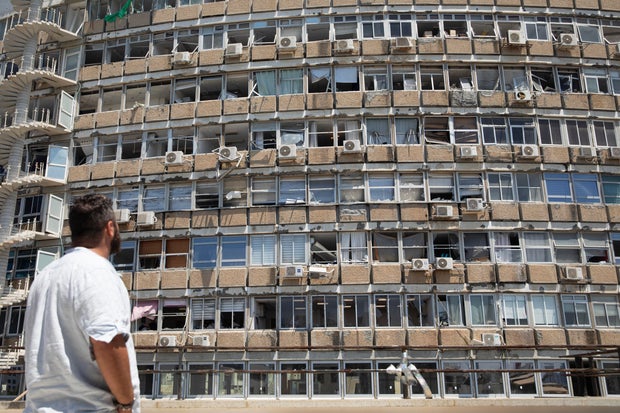CBS News
Israeli military airstrikes hit Houthi targets in Yemen in retaliation to attacks

Israel retaliated for the Houthi drone attack in Tel Aviv with airstrikes in Yemen on Saturday that reportedly struck storage facilities for oil and diesel at a port.
A media outlet controlled by the Iran-backed Houthi movement in Yemen reported the airstrikes in the port city of Hodeidah, which also hit a local electricity company. Al-Masirah TV said the strikes caused deaths and injuries but gave no details, the Associated Press reported.
It said there was a large fire at the port and power cuts were widespread.
Health officials in Yemen told the AP the strikes killed a number of people and injured others, but did not elaborate.
The Israeli military said in a statement Saturday that fight jets struck military targets of the Houthis in the area of Al Hudaydah Port in Yemen. It said the strikes were in “response to the hundreds of attacks carried out against the State of Israel in recent months.”
A U.S. official also confirmed to CBS News that Israel conducted the airstrikes in Yemen in retaliation for the Houthi drone attack in Tel Aviv on Friday that killed at least one person and wounded at least eight others. The official said there was no U.S. involvement in Saturday’s airstrikes.
Houthi spokesman Mohammed Abdulsalam wrote on social media platform X that Yemen was subjected to a “blatant Israeli aggression” and said the attacks aim “to increase the suffering of the people and to pressure Yemen to stop supporting Gaza.”
Abdulsalam said the attacks will only make the people of Yemen and its armed forces more determined to support Gaza.
Israeli Minister of Defense Yoav Gallant said on Saturday they retaliated because it was the first time the Houthi rebels “harmed an Israeli citizen.”
“And we will do this in any place where it may be required,” he said. “The blood of Israeli citizens has a price. This has been made clear in Lebanon, in Gaza, in Yemen, and in other places – if they will dare to attack us, the result will be identical.”
AMIR LEVY / Getty Images
A large explosion rocked the streets of central Tel Aviv in the early Friday morning hours, jolting Israelis out of bed, shattering windows and raining down shrapnel. Later, Israeli military officials said the explosion was caused by a drone fired from Yemen.
Houthi rebels, which have been fighting Yemen’s internationally recognized government in a decade-long civil war, claimed responsibility for the explosion, saying in social media messages that it marked a “new phase” in its operations against Israel in response to the Israelis’ ongoing war against the Houthis’ ideological ally Hamas.
The Houthis said the strike used a “new drone called ‘Yafa’, which is capable of bypassing the enemy’s interception systems,” but a U.S. official told CBS News on Friday, echoing the Israeli military’s analysis, that it appeared to have been one of the group’s existing drones, with a modified fuel tank to extend its range.
The explosion caused by the drone was very near the U.S. consulate in Tel Aviv, but it remained unclear whether that was the target.
Based on verified social media videos, CBS News confirmed the blast occurred a little more than 200 yards from the U.S. consulate in Tel Aviv. A U.S. official told CBS News that no American casualties had been reported.
Since January, the U.S. and British forces have been striking targets in Yemen, in response to the Houthis’ attacks on commercial shipping that the rebels have described as retaliation for Israel’s actions in the war in Gaza. However, many of the ships targeted are not linked to Israel.
The joint force airstrikes have so far done little to deter the Iran-backed force.
The Houthis have launched drones and missiles at Israel and at commercial and military vessels in the Red Sea and surrounding waters throughout the nine-month war, in solidarity with Hamas. But until Friday, all the weapons fired at Israel had been intercepted by either Israel or its Western allies.
CBS News’ Tucker Reals and Eleanor Watson contributed to this report.
CBS News
Man arrested on murder charge 14 years after victim vanished in Virginia

Police arrested a man on murder charges this month, 14 years after he allegedly killed a man in Virginia, but the victim’s body has never been found.
Shane Ryan Donahue, a Virginia man, is presumed deceased, the Prince William County Police Department said Tuesday. He was last seen leaving his parents’ home in Nokesville, Virginia, on March 22, 2010. Donahue, 23, was headed to his house in Nokesville, but never made it there.
Donahue was added to the National Missing and Unidentified Persons System after he vanished. According to records, Donahue did not have a car and regularly got rides from friends. He frequented Washington, D.C., Baltimore, Fauquier County, Virginia, and Northern Virginia.
The case stumped investigators, who followed a number of leads over the years. This spring, detectives reactivated the investigation and started looking at every detail of the case from scratch, officials said. They revisited people who had been interviewed during the initial investigation and reviewed “digital evidence in greater detail due to advances in analytical technology and modern police investigative practices,” according to a news release.
Officers said Donahue was last seen leaving his parents’ home with Timothy Sean Hickerson, now a 43-year-old Florida resident. Investigators connected Hickerson to a burglary at Donahue’s home that happened just days before the Virginia man disappeared.
Detectives got an arrest warrant this month and, with the help of Florida’s Flagler County Sheriff’s Office, Hickerson was taken into custody in Palm Coast, Florida. Hickerson was charged with murder and burglary, is now set to be extradited to Virginia.
CBS News
Trump created the controversial $10,000 SALT deduction cap. Now he wants to end it.

Former President Donald Trump, an avowed proponent of tax cuts, is floating the idea of reversing a measure passed during his tenure in the White House that effectively raised taxes for many U.S. homeowners.
In a post Tuesday on Truth Social, Trump suggested he would scrap a $10,000 cap on deducting state and local taxes (SALT) that was passed as part of the 2017 Tax Cuts and Jobs Act — a massive revamp that he has said boosted economic growth.
Now, in the run-up to the November election, Trump said in the post he would “get SALT back, lower your taxes, and so much more,” although he stopped short of offering details. Trump made the post ahead of a speech he’s giving Wednesday at the Nassau Coliseum on Long Island.
Trump’s new proposal for getting rid of his $10,000 SALT deduction cap comes as the presidential hopeful is pitching several additional tax cuts that would, if enacted, reduce taxes for major groups of voters. He’s also vowed to eliminate taxes on Social Security benefits, a pledge that could get support from the nation’s senior citizens, as well as to end income taxes on tipped workers and on overtime pay, ideas that would help lower- and middle-income Americans.
Yet Trump’s reversal on the SALT deduction has sparked skepticism from lawmakers as well as economists and policy experts.
“So … now Trump is against the SALT tax cap which *checks notes* is a key part of the — only — major piece of legislation passed during his administration?” noted Chris Koski, a political science professor at Reed College in Portland, Oregon, on X.
Rep. Tom Suozzi, a Democrat from Nassau, Queens, said in a statement on Wednesday that he is “happy that the former president is saying that he has finally reversed his devastating decision in 2017 to cap the State and Local Tax (SALT) deduction.” He also urged Trump to convince Republican lawmakers to vote to restore the full deduction “if he is truly serious.”
The SALT deduction cap “has been a body blow to my constituents for the past 7 years,” Suozzi added.
Senator Chuck Schumer, a Democrat from New York, wrote on X,”Donald Trump took away your SALT dedications and hurt so many Long Island families. Now, he’s coming to Long Island to pretend he supports SALT. It won’t work.”
Asked for details about Trump’s proposal to restore the SALT writeoff, a spokeswoman for the Trump campaign told CBS MoneyWatch: “While his pro-growth, pro-energy policies will make life affordable again, President Trump is also going to quickly move tax relief for working people and seniors.”
Here’s what to know about the SALT deduction.
What is the SALT deduction?
The state and local tax deduction allows taxpayers who itemize to deduct property taxes, sales taxes and state or local income taxes from their federal income taxes. Prior to the Tax Cuts and Jobs Act, there was no limit on how much people could deduct through the SALT deduction.
But the 2017 tax overhaul passed under Trump limited the deduction to $10,000 – a blow to many homeowners in states with high property taxes, many of which are Democratic leaning. At the time of the law’s passage, the Treasury Department estimated that almost 11 million taxpayers in high-tax states like New York and New Jersey would forfeit $323 billion in deductions.
Who benefits from the SALT deduction?
Homeowners with high property taxes, such as people in New York, New Jersey and California, were the biggest beneficiaries of the the full SALT deduction.
But some experts also noted that the SALT deduction primarily put more money in the pockets of higher-earning Americans. About 80% of the full SALT deduction had helped people earning more than $100,000 a year, according to the Tax Foundation.
What happened after Trump capped the SALT deduction at $10,000?
The limit has increasingly impacted middle-class homeowners across the U.S. because of rising property taxes and incomes. Some lawmakers have also sought to either repeal or increase the SALT cap, but none of those efforts have borne fruit.
Earlier this year, some lawmakers sought to double the SALT deduction cap to $20,000 for married couples, with the change retroactive for the 2023 tax year. But that bill was blocked in the House in February.
Won’t the SALT deduction cap expire anyway?
Yes, the SALT deduction cap is a provision that’s due to expire in 2025, as are many other parts of the Tax Cuts and Jobs Act, such as a reduction of the individual tax brackets. But Trump has previously indicated he wants to extend the provisions in his signature tax law.
How much would it cost the U.S. to repeal the SALT deduction cap?
It won’t be cheap, according to the the Committee for a Responsible Federal Budget, a think tank that focuses on budget and policy issues.
Eliminating the $10,000 deduction limit “would increase the cost of extending the 2017 Tax Cuts and Jobs Act (TCJA) by $1.2 trillion over a decade,” the group estimates, adding that such a measure would be a “costly mistake.”
Extending the TCJA’s tax cuts would increase the nation’s deficit by $3.9 trillion over the next decade, the group estimates. By adding in a expiration or repeal of the SALT deduction cap, that would grow to $5.1 trillion, it added.
“Lawmakers should not extend the TCJA without a plan to – at a minimum – offset the costs of extension, but ideally the plan would raise revenues relative to current law and help put the nation’s debt on a better trajectory,” the group said in a statement.
CBS News
What Kamala Harris told Latinos at Congressional Hispanic Caucus event

Watch CBS News
Be the first to know
Get browser notifications for breaking news, live events, and exclusive reporting.









